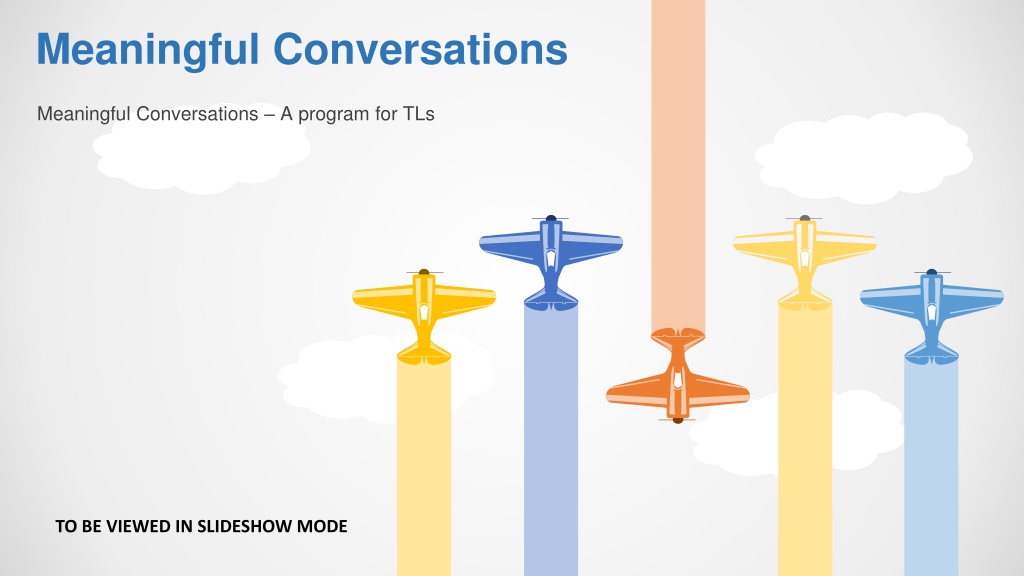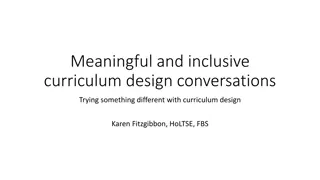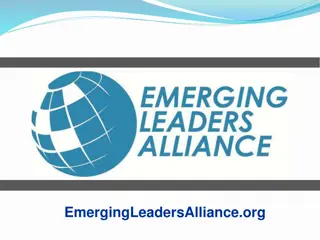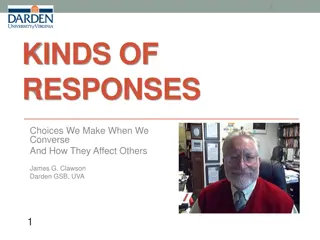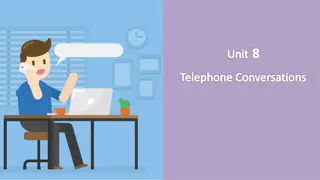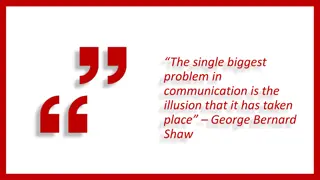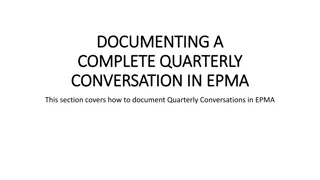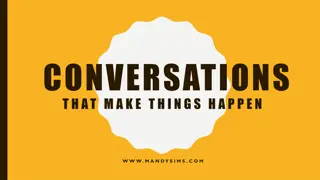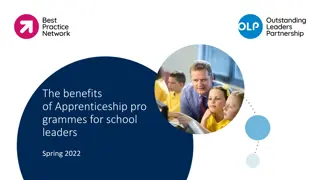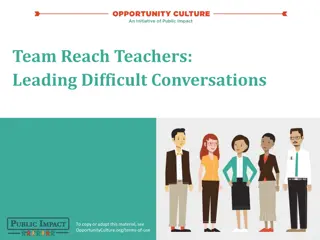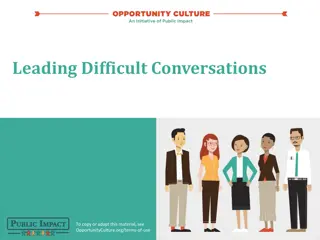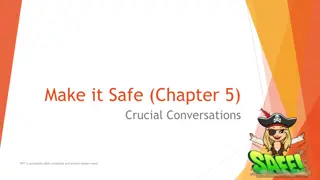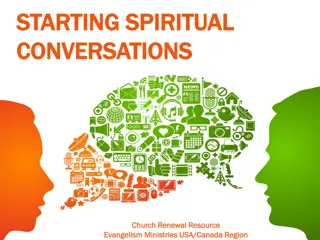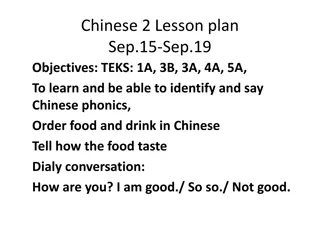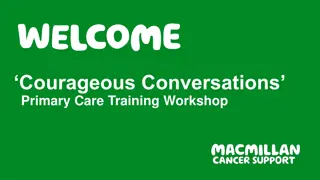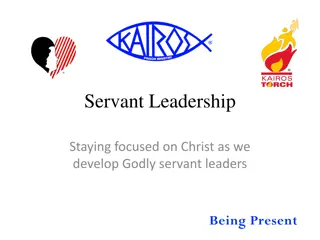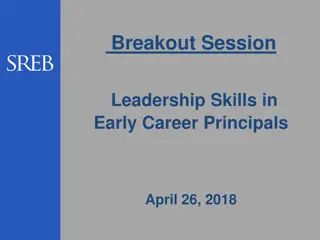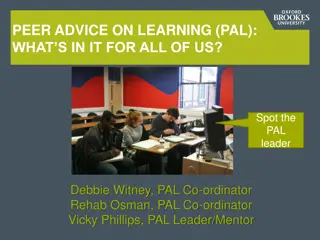Meaningful Conversations for Team Leaders
Equip Team Leaders with skills to conduct impactful conversations in various scenarios through practice sessions covering SBI Feedback Model, tough conversations, retention talks, and crucial moments. The program also includes role-playing exercises and debriefing to enhance communication skills for effective leadership.
Uploaded on Feb 26, 2025 | 0 Views
Download Presentation

Please find below an Image/Link to download the presentation.
The content on the website is provided AS IS for your information and personal use only. It may not be sold, licensed, or shared on other websites without obtaining consent from the author. Download presentation by click this link. If you encounter any issues during the download, it is possible that the publisher has removed the file from their server.
E N D
Presentation Transcript
Meaningful Conversations Meaningful Conversations A program for TLs TO BE VIEWED IN SLIDESHOW MODE
Objective The objective of this program is to equip Team Leaders with skills to conduct meaningful conversations with their team members in a variety of settings. SBI Feedback Model Tough Conversations Retention Conversations Crucial Moments
Philosophy of Program Impactful communication is a skill that can only be developed with practice. It is, in a sense, a physical activity, quite akin to other physical activities such as swimming, playing cricket or acting and singing. The more one practices, the better one becomes. Communication TLs encounter several situations where they need to communicate in an impactful manner, at both individual and team levels. These include coaching, feedback, retention, conflict resolution, team briefings, meetings etc. TL Situations This program has been designed to familiarize participants with these scenarios, and help them acquire skills that will help them communicate in an impactful manner through several rounds of practice. Practice
Session Plan Core of the Program R O L E P L A Y S SL. NO. 1 DAY PROGRAM DURATION 1 Introduction + Objective Setting + Pre-Test 0.5 Hours 2 SBI Feedback Model 3 Hours Giving Feedback (5 Role Plays) Tough Conversations (2 Role Plays Retention Conversations (2 Role Plays) Conflict Resolution (2 Role Plays) 3 Crucial Moments 2 Hours Types of Moments Empathy 2 Role Plays for various scenarios 4 Meetings 2 Hours Team Briefings (2 Role Plays) Conducting Meetings (1 Role Play) 4 Post Test 0.5 Hours
Methodology Example: Tough Conversations: 1. Concept: Learn about tough conversations including a. Applying SBI Model b. Procrastination c. Direct Vs Sensitive messages d. Tips 1. Concept (ILT) 2. Practice: Do Role Plays. Two types of role plays. a. Participants grouped into threes. Each group to have a team member, a team leader and an observer. b. Two volunteers to help facilitator on stage to do a role play, while rest of the class observes 2. Role Play 3. Debrief 3. Debrief: Learning from role plays a. Identify what went right and what went wrong in each role play b. Understand how we would structure the conversation, we would do, if we were to repeat the scenario again (Learning) (Practice)
Sample Role Play Role Play Objective: The team member is a high performer. However, he tends to be rude, gets into loud arguments with his co-workers and makes them uncomfortable. The team leader has decided to have a tough conversation with him. Duration: 15 Mins Total. Instruction: Divide the class into groups of three people each. In each group, one person will play the role of a team leader, while the other will play the role of the team member. Third person will be an observer. Team Leader (Ramya) Brief : One of your team members (Shankar) is a good performer. He has been in your team for 1 year. While Shankar is not the a people centric person, you were fine with it because Shankar could do his job well. However, in the recent past, he has been acting up. He has been rude to his team members gets into arguments over petty issues. You have already spoken to him a couple of times regarding this earlier and Shankar promised to change. But yesterday, Patricia came to you and said she would resign if Shankar this behaviour. It is obvious that Shankar did not change. So you feel its time to have a tough conversation with him now. Team Member (Shankar) Brief: You are a tenured associate and have been with the company for 4 years. The last one year, you have been in Ramya s team. You feel that most other team members are incompetent. You wonder why you have been put in such a team, when you have been a good performer. Team members tend to approach you for clarification on things that they should have learnt during their training. Its not your fault that they did not. Things have come to a level that almost every day, someone will approach you every hour for some clarification or the other. You have had enough of it. Yesterday, when Patricia came to you, you blew it. You blasted her and set an example so that no on every approaches you again. Ramya did speak to you about your behaviour earlier and you mentioned to her that you would tone down a bit. But Patricia deserved it. Ramya has now called you for a meeting, and you know why. Observer: Observe both, the team leader and the team member, having a conversation. Ensure that you make notes. Observe if the team leader is following the SBI model. Check if the team leader is tough and sensitive. Also check if the team leader is avoiding the issue. Ensure that you note down all significant points where you feel the team leader could have done better to communicate to Shankar that his behaviour is not ok. You are also the time keeper. Ensure that the conversation does not extend for more than 10 minutes. After the role play is done, give your feedback to the team leader about where he could have done better.
